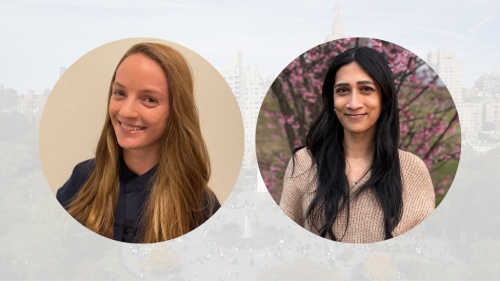
Diana Reina (MS '24) and Saumya Sharan (MS '24)
The NYU Steinhardt Department of Occupational Therapy is pleased to recognize Diana Reina (MS '24) and Saumya Sharan (MS '24) as the 2023 recipients of the Frieda J. Behlen Occupational Therapy Scholarship. The award, named to honor the memory of our department’s generous founder and former chair, Frieda J. Behlen, recognizes high-achieving MS and MS/OTD students with a demonstrated commitment to contributing to the NYU OT community.
Read on to meet Diana and Saumya and learn more about their studies, professional aspirations, and what this accomplishment means to them.
Which parts of your NYU OT studies are most exciting to you?
Diana: There are so many facets of the NYU OT program that I have found exciting! One of my future goals of becoming an advocate and lobbyist for the profession as an OT practitioner did not become clear to me until our Healthcare Advocacy and Administration course. This course made it evident that one of the more direct ways to effect positive changes within OT is to work closely with policymakers to advocate for the profession. I have also enjoyed the courses in the second year, as they have allowed us to take all of the essential foundational information from our first year, such as neuroscience, anatomy, activity analysis, theory, and kinesiology, and practically apply the knowledge to real-world case scenarios.
As I continue to gain momentum for Level II Fieldwork placements, I've enjoyed challenging myself to consider the clinical application of all of our evaluation and intervention courses that will be specific to my assignments. I am grateful and excited to begin my Level II journey at the Stanford Health Care Center in June 2023, where I will work with patients in the neurology and neurosurgery department.
Saumya: Alongside the education that I’m receiving from professors who are experts in their respective fields, the guest lecturers are a particularly exciting part of my studies. Not only do the guest lecturers provide examples from their practice that relate to the class topics, they also provide the chance for me to expand my network within the OT profession and make long-lasting connections while I am still a student. A few of the guest lecturer presentations that have resonated with me were given by Dr. Kristie Patten, Dr. Joan Toglia, Dr. Tsu-Hsin Howe, and Dr. Brocha Stern.
Another exciting aspect of my NYU OT studies has been the opportunity to hone my skills as a researcher. I have been able to apply my research experiences from my time working at Memorial Sloan Kettering Cancer Center by contributing to both Dr. Yael Goverover and Dr. Janet Njelesani’s research studies. I look forward to utilizing my knowledge to make advancements in evidence-based research as a future clinician-scientist in the OT field.
What are your professional goals as an aspiring OT?
Diana: My ultimate goal as a practicing occupational therapist is to provide the best possible care to patients, with specific attention placed on neurological and acute conditions, as well as contribute to research and get involved in public-facing advocacy so that the public at large shares more support and understanding of the field of occupational therapy. My motivation is driven by the financial barriers my family and I have experienced within the American healthcare system. I am working toward a future where my contributions as an occupational therapist will help facilitate change that would allow better access to healthcare services for individuals that are remotely isolated, chronically ill, and low-income, like my family, so that my patients and their caregivers can feel confident to move to their next level of care without worrying about the financial burden of receiving care.
I want to ensure that the term "occupational therapy" is so commonplace that future occupational therapists will no longer need to justify or explain their place within the care team. I plan to do this through public-facing advocacy and lobbying for the profession, research, and education. I would love to work at a teaching and research hospital where I can educate and mentor future OT practitioners while leading research initiatives. I also hope to use my platform as a clinician by contributing to AOTA and NYSOTA's healthcare lobbying efforts. Among these lobbying efforts, I would like to improve access to OT via telehealth for economically disadvantaged individuals and persons with chronic illness; and lobby for an equitable healthcare policy that enforces thorough patient education and post-discharge options with particular emphasis on low-income populations.
Saumya: As an aspiring OT, one of my professional goals is to expand my expertise in the field’s various practice areas by acquiring additional certifications, such as in assistive technology, lymphedema therapy, and hand therapy.
I personally overcame unique obstacles and practiced resiliency, as modeled by my immigrant parents. Despite the inherent challenges of being a first-generation Indian American student, I am fortunate to be where I am today, and I acknowledge the disparity in resources for underserved communities. Hence, another goal of mine is to guide young people of color and introduce them to the OT profession to further diversify our field. I also foresee myself working in satellite facilities that cater to communities with low access to medical care, as well as volunteering in programs that serve struggling populations.
Lastly, I plan to continue advocating for OT by mentoring fieldwork students, promoting the use of evidence-based research, and maintaining/broadening my network of students and professionals in the field.
What does winning this scholarship mean to you?
Diana: When I learned that I had received the scholarship, I called my mother so that we could enjoy the moment together. My family and I have endured and sacrificed so much together to allow me to continue an academic and professional career, and receiving this scholarship feels like such an honor. I'm humbled and grateful that my efforts in contributing to the NYU OT community are being acknowledged by academics and practitioners that I hold in such high esteem within the profession. I hope to have a similar impact as an occupational therapist and advocate.
Saumya: I am humbled to receive the Freida J. Behlen Occupational Therapy Scholarship. It is an honor to be recognized for my academic achievements and contributions to the NYU OT community. I have grown both professionally and personally at NYU, and I am grateful that the scholarship committee believes in me and my potential as an OT. This community equipped me with indispensable skills, and I am eager to share my knowledge with future students to pay it forward. With this scholarship, I am thrilled to continue serving the NYU OT community, while also exemplifying its core values and upholding the program’s prestige both on and off campus.
Support the Scholarship
Department of Occupational Therapy founder and longtime chair Frieda J. Behlen was known to personally provide financial support to help students complete their studies. We hope to further honor her legacy by continuing to increase the size and number of Frieda J. Behlen Occupational Therapy Scholarships awarded with the generous contributions of our alumni community.

Occupational Therapy
Pless Hall, 82 Washington Square East, 6th Floor
New York, NY 10003
Phone: 212-998-5825
Email: occupational.therapy@nyu.edu
